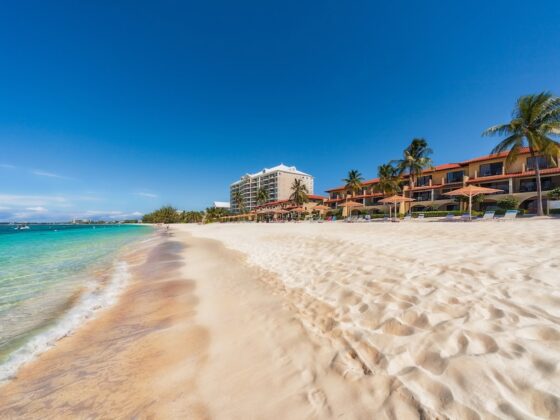The Cayman Islands took a monumental step towards addressing climate change with the approval of its first-ever Climate Change Policy (CCP) for 2024–2050. This landmark initiative, presented by the Honorable Katherine Ebanks-Wilks, Minister for Sustainability and Climate Resiliency, was approved by the Cabinet on September 25, 2024. The Cayman Islands Climate Change Policy (CCP) 2024–2050 is a 26-year strategic action plan crafted to help the Cayman Islands adapt to and mitigate the impacts of climate change, fostering a more resilient and sustainable future for the beautiful Caribbean islands.
The Vision: A Climate-Resilient Cayman Islands
The CCP’s vision is both ambitious and crucial: to achieve “a climate-resilient Cayman Islands that promotes and sustains vibrant communities, a thriving natural environment and a robust economy, where people can live their best lives now and for future generations.” This vision underscores the policy’s commitment to balancing economic growth with environmental protection and social well-being. A copy of the Climate Change Policy (CCP) and a statement by the Hon. Katherine Ebanks-Wilks on the action plan are attached hereof.
The Urgency of Climate Action in the Cayman Islands
Before diving into the climate action plan, it’s important to highlight that climate change poses significant threats to the Cayman Islands. Rising sea levels, increasing temperatures, and more frequent extreme weather events all jeopardize the islands’ ecosystems, economy, and way of life. The CCP represents a crucial step in safeguarding the future of the Cayman Islands against these challenges.
Key Climate Risks Facing the Cayman Islands:
- Sea level rise threatening coastal areas
- Increased frequency and intensity of hurricanes
- Coral reef degradation due to ocean warming and acidification
- Threats to biodiversity, including endemic species
- Economic impacts on tourism and financial services sectors
“The Cayman Islands and the wider Caribbean region have experienced more intense rainfall events and tropical storms, putting communities and critical infrastructure at greater risk of flooding and damage. Warmer sea temperatures and longer periods of drought have placed in jeopardy the health and viability of valuable natural resources, upon which tourism, livelihoods, food security, and our quality of life depend. Our islands remain vulnerable to these direct impacts and to secondary impacts such as the negative effects on trade and tourism from extreme weather events occurring regionally or internationally, or geopolitical policy and regulatory shifts that affect our financial services sector,” expresses the Hon. Katherine Ebanks-Wilks about the climate risks facing the Cayman Islands.
“Nations around the world increasingly recognise that the window of opportunity to mitigate and adapt to climate change is quickly closing. Small islands like the Cayman Islands arguably have an even narrower window to prepare for disruptive impacts that can devastate our communities and the economy. Our country indeed faces a number of complex challenges.”
Core Goals of the Climate Change Policy
The CCP is built on three fundamental goals, each addressing a critical aspect of climate change response:
- Enhance Climate Resilience: Improve the islands’ ability to withstand and recover from climate impacts, ensuring the safety and well-being of communities.
- Transition to a Low-Carbon Economy: Shift towards an economy that minimizes greenhouse gas emissions while promoting sustainable growth and innovation.
- Ensure Fair and Transparent Climate Actions: Implement climate initiatives that are equitable, considering the needs of current and future generations, and governed with transparency and accountability.
 Loading…
Loading…“This Policy is the product of several months of multi-stakeholder engagement convened under our Technical Working Group. It benefits from insights gained through the Climate Change Risk Assessment Public Survey conducted in 2022, and is informed by a Climate Change Risk Assessment generously funded through the Governor’s Office by the United Kingdom’s Conflict, Stability and Security Fund, which supports activities to build climate resilience within the context of sustainable development. Following extensive desktop research, technical stakeholder consultation and public engagement on risks from climatic changes, the resulting Cayman Islands Climate Change Evidence Report (2022) is now the most comprehensive reference document to date on the potential implications of climate change for the Cayman Islands’ environmental, social and economic sectors,” says Neyka Webster, Acting Chief Officer for the Ministry of Sustainability & Climate Resiliency.
“The Climate Change Policy 2024-2050 contains measures required to address the most pressing risks posed by current and continued climate changes to the people, economy and environment of the Cayman Islands.”
Strategic Pathway: From Quick Wins to Long-Term Transformation
The CCP outlines a strategic pathway that balances immediate action with long-term planning:
Quick Wins (2024-2030)
The policy identifies 23 “quick wins” – short-term actions designed to build momentum and deliver visible results. Key initiatives include:
- Identifying climate-related financial opportunities and vulnerabilities
- Reintroducing a sustainable tourism certification scheme
- Implementing a National Sargassum Management Strategy
- Completing the Coastal Setback Reference Line reassessment
- Promoting and incentivising building weatherisation and remediation programmes
- Retrofiting existing shelters and designing new shelters for multi-use purposes to withstand category 5 hurricanes and facilitate post-disaster recovery
These quick wins are designed to address immediate concerns while laying the groundwork for more comprehensive changes.
Evidence-Based Approach and Regular Reviews
The CCP is not a static document but a living strategy designed to evolve with new information and changing circumstances:
- Biennial Reviews: The policy will be reviewed every two years, allowing for the integration of updated scientific findings, climate data, and technological innovations.
- Evidence-Based Foundation: The CCP is guided by the 2022 Climate Change Risk Assessment, ensuring that its strategies are grounded in the most current and relevant climate science specific to the Cayman Islands.
Six Key Focus Areas of the Climate Change Policy
The CCP outlines six strategic focus areas, each addressing critical aspects of climate change mitigation and adaptation:
1. Robust Economy
This focus area aims to diversify the Cayman Islands’ economy and provide resources for sustainable livelihoods. Key initiatives include:
- Developing climate-related financial products and services
- Supporting the growth of green jobs and climate services
- Implementing a National Sargassum Management Strategy
- Enhancing food security through climate-resilient agriculture
2. Liveable Built Environment
This section focuses on creating climate-resilient structures and communities. Notable actions include:
- Revising coastal construction setbacks to protect against sea-level rise
- Incentivizing climate-resilient design standards in new constructions
- Developing comprehensive stormwater management legislation
- Requiring new buildings to be designed for renewable energy integration
3. Healthy & Resilient Communities
Improving health outcomes and community resilience is a key priority. Strategies include:
- Developing heat wave plans to protect vulnerable populations
- Launching community greening projects in underserved areas
- Ensuring access to climate-resilient healthcare services
- Creating multi-use, hurricane-resistant community shelters
4. Resilient Infrastructure Networks
Enhancing critical infrastructure to withstand climate impacts is crucial. The policy outlines plans to:
- Climate-proof fuel terminals, ports, and utilities
- Develop charging infrastructure for electric vehicles
- Improve flood mitigation and prevention strategies
- Enhance the resilience of transportation networks
5. Harmony with Nature
Protecting and leveraging natural ecosystems is vital for climate resilience. Key actions include:
- Expanding terrestrial protected areas to 30% by 2030
- Investing in coral reef restoration and research
- Implementing mangrove replanting and rehabilitation programs
- Preserving wetlands for natural flood management
6. Integration and Coordination
Effective governance is crucial for successful policy implementation. The CCP calls for:
- Establishing a Climate Change Council (CCC) for policy oversight
- Creating a national climate resiliency framework for government entities
- Developing public education programs on climate action
- Integrating climate change issues into academic curricula at all levels
Collaboration and Inclusion: A Whole-of-Society Approach
The CCP emphasizes that addressing climate change requires a collective effort:
- Cross-Sector Collaboration: The policy calls for cooperation between government agencies, businesses, and civil society organizations.
- Equity and Inclusion: Special attention is given to addressing the needs of vulnerable groups, including children, the elderly, disabled individuals, and low-income households. The policy aims to build adaptive capacities across all segments of society.
Implementation Framework
To ensure effective implementation, the CCP establishes key mechanisms:
Climate Change Council (CCC)
The CCC will be a dedicated body responsible for overseeing policy implementation and review. It will promote a cohesive national response to urgent climate action and have oversight of policy implementation across various sectors.
Climate Resiliency Fund
The policy aims to establish a Climate Resiliency Fund through legislation to finance policy initiatives and climate action projects. Additionally, the government will advocate for increased access to international climate finance mechanisms.
Strategic Actions in Key Sectors
The CCP outlines specific actions in critical sectors:
Energy and Transportation
- Promote the expansion of renewable energy programs
- Incentivize the adoption of zero-emission vehicles
- Develop sustainable aviation and marine fuel strategies
Land Use and Waste Management
- Strengthen policies to preserve natural carbon sinks
- Implement strategies to reduce greenhouse gas emissions from waste management practices
Governance, Monitoring, and Review
The CCP emphasizes the importance of effective governance and continuous improvement:
- Governance Processes: Develop new processes and enhance existing ones to enable responsive and effective climate action.
- Monitoring and Review: Conduct regular policy updates and public consultations to ensure the CCP remains relevant and effective.
 Loading…
Loading…A Sustainable Future for the Cayman Islands
The Cayman Islands Climate Change Policy 2024-2050 represents a pivotal moment in the nation’s history. By addressing climate change head-on, the Cayman Islands is positioning itself as a leader in sustainable development among small island nations.
Reducing Risks and Empowering Communities
The policy aims to lower the risks that climate change poses to key sectors and vulnerable groups by reducing vulnerabilities, adapting to changes, and embracing sustainable, low-carbon economic activities.
The Role of Community Engagement
As Minister Ebanks-Wilks emphasized, “The key to success is in collaboration.” The policy’s success relies on the collective effort of government, businesses, and citizens. Public participation and feedback are crucial components of the CCP’s implementation and ongoing development.
The journey towards a climate-resilient Cayman Islands has begun. With this comprehensive policy as a guide, the islands are well-positioned to face the challenges of climate change while creating new opportunities for growth and development. The Cayman Islands’ commitment to sustainability sets an inspiring example for other nations, demonstrating that even small countries can make a big difference in the global fight against climate change.
As the Cayman Islands embarks on this ambitious journey towards sustainability and climate resilience, Complete Clean continues to play a crucial role. The new Climate Change Policy 2024-2050 aligns closely with our longstanding commitment to environmental stewardship.
At Complete Clean, we have been proactively implementing eco-friendly practices that support the policy’s goals. Our use of environmentally-friendly cleaning products reduces harmful impacts on the islands’ delicate ecosystems. Our water conservation techniques and energy-efficient equipment contribute to resource preservation. By minimizing waste and embracing digitization to reduce paper use, we’re already working towards the policy’s aim of a low-carbon economy. The policy’s focus on community resilience and education resonates with our ongoing efforts in sustainability education and community involvement, including participation in local beautification projects.
As the islands transition to meet new environmental standards, we are well-positioned to support and advance the goals of this important policy through our services. We look forward to continuing our collaboration with local sustainability programs and like-minded businesses, driving innovation in eco-friendly cleaning practices, and contributing to a greener, more sustainable future for the Cayman Islands.






